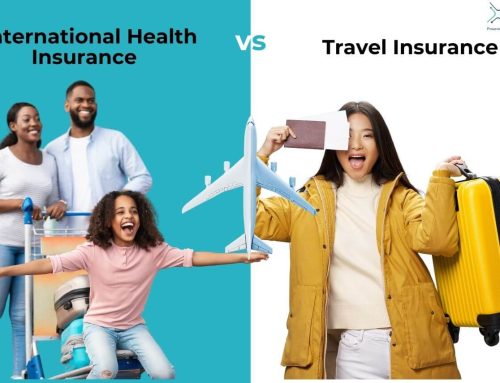The healthcare landscape in Kenya is undergoing significant transformation. With the recent shift from the National Health Insurance Fund (NHIF) to the Social Health Authority (SHA) and increasing reliance on private health insurance in Kenya, individuals, organizations, and expatriates are exploring better ways to secure quality healthcare without imposing a financial burden on citizens. This change, driven by the government’s commitment to Universal Health Coverage (UHC), reshapes how individuals and corporations approach health insurance.
In this post, we’ll explore Kenya’s evolving healthcare insurance market, the leading private health insurance providers in Kenya, and the critical role of International Private Medical Insurance (IPMI) in offering world-class healthcare coverage.
The Role of Private Medical Insurance in Kenya
Private health insurance providers are vital in bridging the gaps left by public healthcare schemes by offering comprehensive healthcare services. For individuals, families, and corporations looking for premium coverage, private insurers provide customized solutions ensuring quality care at local and international hospitals.
Best Health Insurance in Kenya: Top 3 International Private Health Insurers
The healthcare landscape in Kenya continues to evolve, and finding the best International health insurance coverage is a priority for individuals, families, expats, and businesses. Below are the best International health insurance providers in Kenya, categorized further to highlight international health insurance options:
Allianz – Represented by Executive Healthcare Solutions (EHS) in 11 Countries
Executive Healthcare Solutions (EHS) is Allianz’s principal representative in 11 African countries, including Kenya, Uganda, Tanzania, Rwanda, Burundi, Zambia, Malawi, Mozambique, Ghana, Nigeria, and South Africa. EHS provides International Private Medical Insurance (IPMI) solutions with Allianz, ensuring seamless access to International premium medical coverage. Their offerings include emergency medical evacuation, hospitalization, specialized treatments, and global healthcare access for expatriates, individuals, families, and corporations.
Bupa Global
Bupa Global is a leading provider of international health insurance, offering medical coverage and access to an extensive network of private hospitals and specialists worldwide. Renowned for its high-end health plans, Bupa Global caters to expatriates, business professionals, and individuals seeking international healthcare solutions.
As an official provider, MIC Global Risks (Insurance Brokers) facilitates access to Bupa Global’s premium international medical insurance, ensuring clients receive world-class healthcare coverage tailored to their needs.
Cigna Global
Cigna Global offers flexible international health insurance plans for expatriates and globally mobile individuals. Their coverage includes wellness programs, emergency medical evacuation, and 24/7 support, ensuring policyholders receive top-tier medical care.
MIC Global Risks (Insurance Brokers) is an official Cigna Global medical coverage provider in East Africa. They offer individuals and businesses easy access to top healthcare solutions.
Types of Private Health Insurance Programs in Kenya
Private health insurance in Kenya caters to individuals, families, and corporate clients through various plan structures:
- Comprehensive Health Plans: Cover inpatient and outpatient services, including maternity, dental, and chronic disease management.
- Corporate Insurance Plans: Tailored for businesses, providing healthcare benefits for employees and their dependents.
- International Health Insurance: Offers coverage beyond Kenya, ensuring access to premium medical facilities worldwide.
These health insurance policies can vary widely regarding coverage options, costs, and benefits, allowing individuals and businesses to choose plans that best meet their needs.
In addition to these primary types, private health insurance programs may offer specialized optional coverage for dental, vision, and mental health services. Some plans include additional benefits like wellness programs, health coaching, and disease management services. These programs meet the specific needs of individuals, families, and employers, providing comprehensive health services and financial protection against medical expenses.
The private health insurance programs can be purchased through employers, insurance brokers, or directly from insurance companies. Whether you are looking for individual coverage or employer-sponsored health insurance, private health insurance offers peace of mind and access to quality healthcare.
Transition from NHIF to SHA: Impact on Private Health Insurance
Kenya’s transition from the National Health Insurance Fund (NHIF) to the Social Health Authority (SHA) is a step toward Universal Health Coverage (UHC). However, SHA does not eliminate the need for private insurance, especially for expatriates, individuals, and corporate clients who require access to premium healthcare and international medical services.
International Health Insurance
For those seeking international health insurance, Executive Healthcare Solutions (EHS) leads the pack in offering International private health insurance coverage for global healthcare access, including:
Choosing the right health insurance plan ensures access to premium medical facilities within your coverage area.
- Global coverage is available through Allianz Care’s extensive network.
- Customized Plans for expatriates, corporates, families, and individuals.
- Premium Services, including 24/7 customer support and hassle-free claims processing.
Health Insurance Coverage Penetration Rates in Kenya
Despite increasing awareness, health insurance penetration in Kenya remains at only 20%. Barriers to higher adoption include:
- High cost of premiums.
- Limited awareness of private health insurance benefits.
- Administrative challenges in claims processing.
- Lack of trust in insurance providers.
The Growing Demand for International Private Medical Insurance (IPMI) and Employer-Sponsored Health Insurance
The rise of International Private Medical Insurance (IPMI) has transformed healthcare access for individuals and corporations seeking comprehensive private insurance and global coverage. IPMI caters to high-net-worth individuals, expatriates, multinational corporations, and frequent travellers, offering access to the best medical facilities worldwide.
International Private insurance plans offer a range of benefits, including access to mental health services and comprehensive coverage for various medical needs.
Key Features of IPMI by Executive Healthcare Solutions:
- A global network of hospitals and clinics.
- Comprehensive coverage plans for outpatient, inpatient, maternity, and chronic conditions.
- Tailored solutions for corporates, individuals, and expatriates.
- 24/7 support and streamlined claims processing.
Cost and Affordability of Private Health Insurance
The cost of private health insurance in Kenya can vary widely based on several factors, including age, health status, location, and the level of coverage desired. Understanding these factors can help individuals and businesses make informed decisions about their health insurance plans. Private health insurance can help cover the costs associated with treatments at a private hospital, providing policyholders access to high-quality medical care.
Premiums: The monthly or annual cost of private health insurance premiums can be influenced by tobacco use, family size, and income level. Employers often offer private health insurance as a benefit, sharing the cost of the premium with employees. This employer-sponsored health insurance can make coverage more affordable for employees.
Subsidies and Cost-Sharing Reductions: For eligible individuals and families, premium subsidies and cost-sharing reductions (CSRs) may be available to help make private health insurance more affordable. These financial aids can significantly reduce the overall cost of coverage and out-of-pocket expenses.
Out-of-Pocket Costs: Private health insurance plans may have out-of-pocket costs such as deductibles, copays, and coinsurance. These costs can affect the overall affordability of care. However, many plans offer maximum out-of-pocket limits, which provide financial protection against high medical expenses.
Financial protection against medical expenses and peace of mind ensure access to quality healthcare services. Whether purchased through the Health Insurance Marketplace or directly from insurance companies, these plans provide peace of mind.
Effects of Health Insurance on Health Outcomes
Private vs. Public Health Insurance
Public and private health insurance represent two distinct approaches to providing healthcare coverage, each with its own advantages and limitations. Private health insurance is typically offered by employers or purchased individually, providing policyholders with comprehensive coverage and greater flexibility in choosing healthcare providers. However, this flexibility often costs more than public health insurance plans.
Public health insurance, provided by the government, aims to offer essential health benefits to low-income individuals and seniors. Programs like Medicaid and Medicare are designed to ensure vulnerable populations can access necessary healthcare services. While public health insurance plans are generally more affordable, they may come with limited provider networks and fewer coverage options.
Employer-sponsored health insurance plans, a subset of private health insurance, are particularly beneficial as they often provide employees with extensive coverage at a reduced cost. These plans can include additional benefits such as dental and vision coverage, making them an attractive option for many workers.
On the other hand, public health insurance plans focus on providing essential health benefits, ensuring that basic healthcare needs are met. Despite their affordability, these plans may not offer the same flexibility or comprehensive coverage as private health insurance plans.
Ultimately, the choice between private and public health insurance depends on individual circumstances and priorities. Cost, coverage needs, and provider preferences determine the most suitable option for each person.
Regulatory Framework for Private Health Insurers in Kenya
Insurers in Kenya operate under the Insurance Regulatory Authority (IRA) and must comply with:
- The Health Act 2017 which governs healthcare services, including private insurance.
- The Social Health Authority Act shapes the future role of private insurance alongside government health programs.
- Kenyan Insurance Laws, ensuring transparency, financial stability, and policyholder protection.
Regulations also ensure that private insurers provide adequate coverage for mental health care, addressing the needs of individuals with mental health conditions.
The Future of Private Health Insurance in Kenya
Kenya’s private health insurance market is poised for significant growth in the coming years. The government’s ongoing efforts to enhance healthcare access through initiatives like the Social Health Insurance Fund (SHIF) are expected to drive this expansion. As the demand for quality healthcare services continues to rise, private health insurance providers will likely see increased interest from individuals and corporations seeking comprehensive coverage.
Innovation will be a key driver of growth in the private health insurance sector. Providers are expected to expand their product offerings and leverage technology to meet consumers’ evolving needs. Mobile health insurance platforms, for instance, are anticipated to become more prevalent, offering convenient and accessible solutions for policyholders.
The competitive landscape of the private health insurance market is also expected to intensify, with new entrants and existing players vying for market share. This competition will likely lead to improved services and more affordable consumer options.
Regulatory frameworks will continue evolving, ensuring private health insurance providers operate transparently and fairly. The government’s role in shaping these regulations will be crucial in maintaining a balanced and effective healthcare system.
Despite the positive outlook, challenges such as affordability and accessibility remain. Private health insurance providers must continuously innovate and adapt to address these issues, ensuring that quality healthcare services are accessible to a broader population.
In conclusion, the future of private health insurance in Kenya looks promising, with significant growth and innovation on the horizon. As the market evolves, private health insurance will play an increasingly important role in providing access to quality healthcare services, ultimately improving health outcomes for many Kenyans.
Conclusion
The healthcare insurance market in Kenya is evolving rapidly. As we move from NHIF to SHA, more people turn to private health insurance. This is seen as a better choice for good and dependable medical coverage. With the growing demand for International Private Health Insurance, individuals and corporations can access better healthcare solutions than ever before.
If you want the best International Private Medical Insurance in Kenya, consider Executive Healthcare Solutions. They provide excellent coverage. This can give you peace of mind.
Partner with Executive Healthcare Solutions today to explore the best international health insurance options and secure global healthcare access.



